The 2005 IAAF World Athletic Championships returns to Helsinki, Finland, site of the inaugural global championships in 1983. For nine days in early August, the athletic world will be focused on the unfolding drama and riveting competition for championship medals, personal glory, and national esteem.
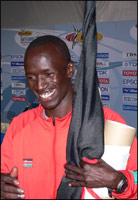 When the athletic world convened two years ago in Paris, Kenyan efforts were besieged by injury, unassertive running, the Qatari factor, Lagat’s false positive, and healthy doses of bad luck and misfortune – only to be salvaged by the courageous runs of Catherine Ndereba and Eliud Kipchoge. Over the past two years much attention has been focused on slipping Kenyan fortunes amidst shifts in the balance of distance running power.
When the athletic world convened two years ago in Paris, Kenyan efforts were besieged by injury, unassertive running, the Qatari factor, Lagat’s false positive, and healthy doses of bad luck and misfortune – only to be salvaged by the courageous runs of Catherine Ndereba and Eliud Kipchoge. Over the past two years much attention has been focused on slipping Kenyan fortunes amidst shifts in the balance of distance running power.
We can look back to the 1983 edition of the World Championships to gain some perspective on how athletics has changed, and continues to evolve. Consider that Julius Korir was Kenya’s top finisher in 1983, placing 7th in the steeple, the only Kenyan steepler in the finals. Paul Kipkoech finished 9th in the 5,000, and Mike Boit 12th in the 1500. Kenya did not even tender an entrant in the 10K or marathon, and not a single Kenyan woman competed in Helsinki. By these standards, Kenya’s current tribulations seem to be just a rough patch.
The sport changed in the late 1980’s as African athletes, principally Kenyans and Ethiopians came to dominate distance competitions – and it is changing again in the early years of the new century as distance talent is emerging throughout Africa. Kenya must now compete with very talented and dedicated athletes from Eritrea, Uganda, Tanzania, Morocco and South Africa, not to mention the former Kenyan athletes enticed to the petrol states of Qatar and Bahrain.
There is also Kenenisa Bekele whose immense talents seem to have cast a spell over the Kenyan psyche that is even greater than his predecessor Haile Gebrsalassie. In all, today’s Kenyan squad faces a far more formidable challenge then in years past.
In this context, it is quite remarkable that the Helsinki team should contend for medals in all six men’s distance events from 800 meters through the marathon. This array of talent is a remarkable feat matched only by the United States’ presence in the sprints and hurdles, and unparalleled in the distance events as even Ethiopia which is so strong in the 5 and 10K has little to offer in other events.
This fine array of talent does not necessarily translate into medals, but it is a feat that speaks loudly about the resurgence of Kenya’s fortunes – and the emergence of a new generation of young Kenyan stars who grew up knowing only of Kenyan success. Despite the dilution of talent to the petrol teams, Kenya continues to produce superb athletes ready to take up the challenge of putting the Kenyan vest out in front.
While the Helsinki team features past Olympic or World Champions Nedereba, Kipchoge, Charles Kamathi, and Ezekiel Kemboi, it is very much a team that represents Kenya’s future with rising stars Issac Songtok, Daniel Kipchirchir Komen, Alex Kipchirchir, Brimin Kipruto, Paul Kipsiele Koech and Alfred Kirwa Yego ready to step up to the world stage.
Middle Distance 800 and 1500 Meters
The Kenyan 800 team of Wilfred Bungei, Wiliam Yiampoyi and Alfred Kirwa Yego looks to be very competitive in this wide open event with at least a dozen serious contenders for the medal stand. While Bungei’s Kenyan Trials win of 1:44.11 stands as the fastest clocking in the world through mid-July, no less than 18 athletes have run within .81 seconds of that time – a gap of just six meters over the 800 meter distance. The times will drop as the season heats up, but this is an event that will be settled on the track with very competitive semis and final.
Bungei claimed the silver medal at the 2001 World Championships in Edmonton and has clipped off a series of fast races this year. Yet three sub 1:44.4 clockings produced only one victory as Olympic silver medalist Mbulaeni Mulaudzi of South Africa took the win in the Athens GP, and Moroccan Amine Laalou and Bahrain’s Youssef Saad Kamel both beat Bungei to the line in Seville.
The three rounds of racing may favor Russian Olympic champ Yuriy Borzakovskiy who lays off the pace but can tear up the finishing straight if the door is left open. The tall Russian always makes for exciting racing as he often has left his sprint too late, but he got the timing just right in Athens.
Wilson Kipketer can not be counted out in this his final championships, and we don’t know what to expect from 17 year-old Belal Mansoor Ali who clocked 1:44.34 in early July, and Kenya’s own 19 year-old phenom Alfred Kirwa Yego who scored a big win in the Rome GP. The third member of the Kenyan squad William Yiampoy ran under 1:44 three times last year and has the knack of consistently finishing in the top four.
The 1500 is an event that is also up for grabs given the uncertain status of mile king Hicham El Guerrouj who has been sidelined by illness through July, and the adoption of US citizenship by his chief rival Bernard Legat who must sit out the championships.
The new Kenyan stars Daniel Kipchirchir Komen and Alex Kipchirchir are in good position to earn medals despite being just 20 years old.
Komen has been the dominant runner on the circuit with four races under 3:31.5 including a 3:30.01 clocking to beat Lagat in Paris, and a win in the Kenyan Trials. Kipchirchir ran 3:31.10 in Doah and 3:30.82 in Paris. Short on experience, these two young stars are long on talent and have arrived on the 1500 scene as if they belong. They will have the opportunity to prove that in Helsinki – and perhaps even claim Kenya’s first World Championship gold in the 1500.
If El Guerrouj is not in top form, Rashid Ramzi who scored a 3:30.00 win over Komen in Rome may be the man to beat, along with Ivan Heshko who is very experienced in championship racing. Not to be overlooked are Athens bronze medalist Rui Silva, France’s Mehdi Baala, Oatar’s Daham Najim Bashir, and American Alan Webb.
Initially Paul Korir was named to the team, but after failing to finish two races in Europe, Augustine Kiprono Choge was selected as a replacement. Choge took the Junior World Cross title in March and ran 3.33.99 in June, 3:34.74 in July, and a sparkling 12:53.66 to finish 4th in the Rome 5K. The longer race might be Choge best event, but there is no room on a very talented 5K squad, and this is a good move to give the young and talented Choge World Championship experience.
The key to strong Kenyan performances in the middle distances may well lie in the preliminary rounds. In recent championships many of the Kenyan athletes were knocked off stride by the physical tactics and erratic pacing common in these competitions where it seems that arms are often more active than legs.
This type of race should be expected and tactical plans can be made to fend off the pushing and to anticipate or dictate the critical surges in pace. Experience also suggests that athletes are far better off staying close to the front rather than trying to save their efforts through the rounds. These coveted medals are not awarded by default, they must be earned on the track, executing all three rounds with sharp focus and racing skills.
Kenya’s Strengths -5000 and Steeple
Thanks to defending champ Eliud Kipchoge’s wildcard, Kenya will send four strong athletes into the 5,000, perhaps the championship’s most competitive event. Olympic double champion Hicham El Guerrouj has been battling illness and has yet to surface in the 2005 season, and Bekele has suggested that he may not double after 5K losses in Paris and Athens.
Pay no attention to this talk, barring injury Bekele will toe the line in the 5,000 and undoubtedly he will be the man to beat as the harrier king’s best days are still ahead of him on the track. The Ethiopian star has all the requisite racing skills, and he has taken ‘doubling’ to an art-form with his four World Cross doubles, but Bekele is still in the process of transferring his unrivaled confidence on grass to the track.
The Kenyan squad must expect the best from Bekele and welcome the opportunity to compete with the best – and this Kenyan squad may well be up to the task. This is an exceptionally strong quartet, combining the youth of Kenya’s two greatest stars – Paris champ Kipchoge and this year’s sensation Issac Songtok, with the experience of veterans Ben Limo and John Kibowen.
Limo ran 12:58.72 in 1999 to take the silver medal in Seville, and has returned to fine form chasing Songtok to the line at the Kenyan Trials. Kibowen is always in the hunt in championship races, having claimed the bronze medal in Edmonton, and has been with the lead pack 500 meters from the finish in both the Paris and Athens 5K competitions. Both of these veterans can not be counted out of the medals, but Kenya’s hopes will be pinned on the vests of Kipchoge and Songtok.
Since his victory in Paris, Kipchoge has raced consistently at a high standard, clocking PRs of 3:33.20, 7:27.72 and 12:48.53, and picking up the bronze medal in Athens. Kipchoge’s Paris win came after he was able to survive the attacks of Bekele and El Guerrouj. In 2004, Kipchoge developed attacking tactics of his own, delivering sharp mid-race spurts that shredded the field at the Kenyan Olympic Trials. Kipchoge applied that tactic in Athens, but the early pace was so soft that the attacks proved ineffective. Over the long course of Kenyan history in this event, the best results have come with mid-race attacks rather than finishing kicks. Kipchoge has won with a kick, but his best option may be a series of sharp attacks off a fast pace.
Songtok has been the Kenyan find of 2005 as the 3:30.99 1500 runner moved up to the 5000 with superb results, twice beating Kipchoge. The first was a strong run at the Kenyan Trials where in fairness Kipchoge had planned on the 1500, the later was a more telling 12:52.8 win in the Rome GP.
The 21 year-old Songtok is not new to the 5K as he competed over the distance as a junior and the versatile runner who claimed the 4K bronze at this year’s World Cross has even dabbled in the steeple. Songtok’s tactical experience in the 1500 – where crucial decisions are made at break-neck pace -should be of great value in the 5K. Likewise his finishing gear that was adequate in 1500 has proven quite effective in the longer race.
Two things stand out about Songtok who is mentored by Brother Colm: First, Songtok runs in a compact powerful stride that speaks volumes of his core strength – and his prospects over 5,000 meters. Second, despite setbacks in Paris and Athens, Songtok relishes competition and has knowingly jumped into the ring with Kipchoge and Bekele, and he is very determined to prove his merit.
The 5,000 will be the featured event on the final day of the championships, and it has the potential to match the high drama of the Paris super-race. The 5,000 is also the best match-up between Kenya and Ethiopia in this championships as Bekele will be accompanied by Gebre Gebremariam who followed Songtok and Kipchoge home in Rome in 12:52.80 and either Abebe Dinkesa or Dejene Birhanu. With both Bekele and Gebremariam doubling off the 10K and the possible presence of El Guerrouj, the Kenyans will fare best with a fast pace, and collectively they can not let the pace lag at any point.
3000 MeterSteeplechase
Kenyan sends to Helsinki the same trio of athletes that swept the Athens medals, Ezekiel Kemboi, Brimin Kipruto, and Paul Kipsiele Koech. Kemboi and Brimin took the top two spots at the Kenyan Trials, and the final spot on the steeple squad was on the line in the Rome GP. Keoch was not to be denied as he gave Kenyan ex-patriot Saif Saaeed Shaheen all he could handle, pushing the Qatari World Record holder and Paris World Champ to the line with a superb 7:56.37 effort.
Shaheen is probably in the best shape of his life having gained strength at a winter training camp in Eldoret, and evidenced in his 8th place finish in the long course race at this year’s World Cross, a day after being rebuffed by Bekele in the 4K. Shaheen has not been beaten in a steeple for three years and he will toe the line in Helsinki as the clear favorite.
Kemboi has been the ace of the Kenyan steeplers for the past three years, winning a silver medal in Paris and the Olympic gold medal in Shaheen’s absence in Athens. Brimin Kipruto is just 20 and has lowered his best to 8:04.22, and now seems poised to step-up and join the event’s elite.
Shaheen’s ability and propensity to toy with the pace always makes for interesting racing, and may open the door for the Kenyan trio to execute a successful tactic. While devising a strategy to best the former Stephen Cherono is the primary focus, the Kenyan squad can not overlook Moroccan Brahim Boulami and the Qatari duo of Moussa Omar Obaid and Jamal Bilal Salem.
Long Distance – The 10,000 and Marathon
The challenge in the 10,000 is great with Bekele’s Paris win earning a fourth entrant from the powerful Ethiopian squad. Bekele will be hard to beat, as will his comrades Sileshi Sihine the Olympic silver medalist, Abebe Dinkesa who ran 26:30.74 this May, and Gebre Gebremariam. With the Ethiopians keen to repeat their sweep of the medals, the Kenyan trio of Moses Mosop, Martin Mathathi and Charles Kamathi will be a great success if they can manage to put even one runner in medal contention over the final kilometer.
Mosop has perfomed exceptionally in the high altitude of Nairobi, finishing second in last year’s Olympic Trials, and taking the win in this year’s Helsinki Trials. Martin Mathathi is just 19 and he is already an established star on the Japanese circuit running 27:08.42 in April. Rounding out the squad is 2001 World champ Charles Kamathi who knows a lot about competing with the Ethiopians.
This event is also characteristic of the expanding realm of distance running and the Kenyan squad will have to contend with athletes such as Eritrea’s Zersenay Tadesse, Uganda’s Boniface Kiprop, Tanzanian Fabian Joseph, and Kenyan ex-patriot Mushir Salim Jawher.
Marathon
On almost every Sunday of the year, a Kenyan runner wins a marathon somewhere in the world – often it is two or three champions on the same day. In sheer numbers, the marathon is by far Kenya’s strongest event, yet quality performances have often been elusive in championship events as the top athletes are more focused on the big city marathons, and the hot conditions and challenging championship courses make for a different type of competition.
All that said, it is about time that the Kenyan squad exerts their presence in this event, especially one that features a team competition based on the combined time of a country’s first three finishers from a five-man squad.
Despite losing London champ Martin Lel to injury, the squad of Robert Cheberor (2:06.23), Jimmy Muindi (2:07:50), Paul Biwott (2:08:17), Joseph Riri (2:06:49) and Wilson Onsare (2:06.47) is a very capable squad. All are experienced veterans with strong competitive records as Cheberor won in Amsterdam last October, Muindi won this April’s Rotterdam Marathon, Biwott finished second in Paris this April, Riri was second last October in Berlin and won in Otsu this spring, and Onsare finished second this year in Boston.
The Kenyan team needs to pay particular attention to two aspects of this competition. First, the very fast pace set in big city marathons often yields races of attrition with limited tactics. In championship races the early pace often lags and tactics must be calculated by measuring attacks backwards from the finish line. The five-man squad team may be best off to follow the strategy of Kenya’s gold medal harrier teams which committed to a team plan for the initial three-fourths of the race, then chased individual glory in the final kilometers. The team gold should be the primary focus, and if the team tactic goes well there should be opportunity to race for individual medals.
A second concern is the 14:20 starting time of the Helsinki marathon. The early morning training habits of Kenyan athletes prepares them well for the early start times of big city marathons, and some attention should be given to adapting to the afternoon start. One favorable aspect for the Kenyan squad is that with the cool climate and circuit course, this marathon may run more like a big city race than the typical hot and difficult championship course.
While a considerable number of the world’s top marathoners will not compete in Helsinki, the field includes Olympic champion Stefano Baldini of Italy and Paris champ Moroccan Jaouad Gharib. Also expected to contend are Japanese record-holder Toshinari Takaoka, and New York City champ Hendrick Ramaala.
Women’s Team
Kenya has long depended on Catherine Ndereba to deliver – whether it be wins in big city marathons, a world record clocking, or championship medals. Indeed Ndereba with three sub-2:20 clockings, four victories at Boston, a World Championship gold in Paris and an Olympic silver in Athens, has proven to be Kenya’s most dependable athlete.
While capable of fast paced competitions, Ndereba’s patient racing disposition is especially well suited to tactical championship marathons. This was clearly evident in Paris where the slow early pace made it rough running in the huge pack that toured the first half. Wanting no part of the jostling, Ndereba calmly eased back at 10K, shadowing the lead pack from 40 meters behind where she could run freely. Ndereba calmly moved up when the serious moves were delivered after 25K, and left the pack behind over the last 5K to claim the gold that ended an eight day Kenyan drought in Paris.
Catherine ‘The Great’ remains in top-form after her April win in Boston and her recent half-marathon win in Japan over Olympic champ Mizuki Noguchi. Yet, it is very likely that Ndereba will be battling Paula Radcliffe who has eclipsed the Kenyan’s former world record on three occasions.
Ndereba will have a stiff challenge as Helsinki’s high latitude and circuit course is far more conducive to the blistering pace Radcliffe prefers than the hot and hilly Athens route. Radcliffe will be in her own element and the gallant Brit yearns to snare the elusive championship gold medal – the only honor missing in her brilliant career.
Ndereba will also have to contend with the always formidable Japanese squad led by Mari Ozaki and Megumi Oshima, Romania’s Constantina Tomescu-Dita, and Chinese new find Chunxiu Zhou.
Former World Record holder Telga Loroupe returns to the Kenyan squad along with Beatrice Omwanza, Rita Sitienei, and Helen Kimutai. Despite missing many of Kenya’s top women, Ndereba’s expected high finish gives this squad an opportunity for a team medal. Yes, once again all of Kenya is depending on Ndereba to come through in this most unpredictable event.
Edith Masai is Kenya’s next best hope as the veteran competes in the 10,000. While stomach problems slowed Masai at the Kenyan Trials, she was given a ‘wild card’ selection based on a string of fine runs on the European circuit. A gold-medal harrier, Masai is a fierce competitor and has transferred her skills to the track clocking 30:51.99 for 10K, and 14:37.20 for 5K in Rome, but couldn’t match the swift kick of Tirunesh Dibaba.
Masai will have her hands full when Diababa, her sister Ejegayehu, and Werknesh Kidane take to the track on the second night of the championships. The three Etiopians have all run under 30:20 this year, and the moderate Helsinki climate suggests that a 30:00 pace is possible. This will require a very high effort from the Paris 5000 bronze medalist, but if Masai is able to survive the brutal pace, she is very capable of a medal-caliber finish – especially if it is drawn out over the final kilometer.
Olympic silver medalist Isabella Ochichi and Prisca Jepleting will take up the Ethiopian challenge in the 5000. This may be difficult as the trio of Tirunesh Dibaba, Berhane Adere and Olympic champ Meseret Defar all ran 14:32 in Rome.
Overview
Once again the state of Kenyan athletes will be appraised on the stage of the IAAF World Championships. Inevitably, the success of the Kenyan squad will be measured by the medal count, and these medals are almost as difficult to earn as they are to predict.
Chances are this Kenyan team will fall short of the 10 medal standard set in 1993 in Stuttgart, and we hope that there is improvement on the two gold, one silver, and one bronze total in Paris.
The Helsinki 2005 team is led by a core of veterans who have already earned championship medals, but it is also a team that introduces a new generation of young Kenyan runners to the world stage. History tells us that young, relatively inexperienced runners often encounter unexpected difficulties in championship competitions, and if this is the case the Kenyan squad may be hard pressed to win a half-dozen medals.
Yes, Team Kenya is heavily invested in this new generation, and their success or failure perhaps may be best judged by the number of athletes qualifying for finals or placing in the top-ten. We are always captivated by medal counts, but this is a far better measure of the state of Kenyan athletics. Note that in the tally of athletes ranked in the top-ten for all events by Track & Field News in 2004, Kenya’s total of 150 points was second only to the USA’s 265, and well ahead of Russia in third place with 83, and Ethiopia fourth with 58.
If Kenya is going to continue to compete for medals, there is a perpetual need to introduce young stars to international competition. The relative youth of the Helsinki team may prove to be a weakness, but this team is clearly a building block for the future. Also consider that 18 year-old Samuel Wanjiru, and rising stars Shadrack Kosgei and Hillary Chenonge are not on the Helsinki squad, but may well be among Kenya’s elite when the World Championships are next contested in 2007 in Osaka, Japan.
Another unavoidable aspect with these championships is coming to grips with the expected success of Kenyan ex-patriots competing for foreign vests. Yes, Kenya for a long time has had to accept the Denmark vest worn by 800 meter world record holder Wilson Kipketer, but the outbreak of defections in recent years has recast this issue.
While the forsaking of the Kenyan flag for petrol dollars goes against every bone in our collective body, there is something about the heart of these athletes that is still Kenyan. This sentiment will not alter the medal count, but it does not diminish the contribution of Kenyan athletes to the world of athletics – as defined by Helsinki 2005.
source Sean Hartnett for The Athlete

















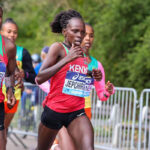
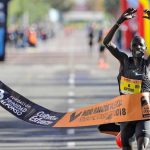
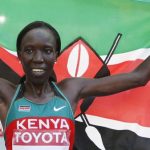
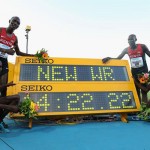


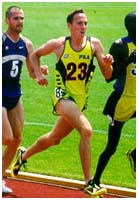



Speak Your Mind